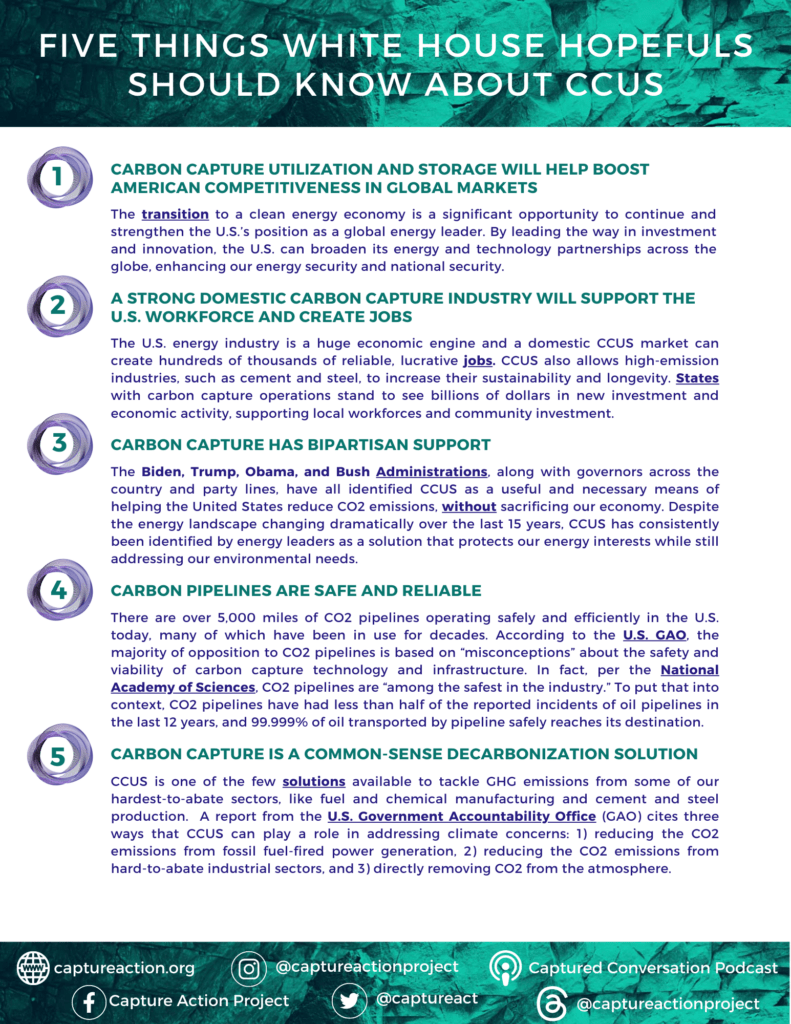At about 15 months out from the 2024 U.S. presidential election, there are at least 15 candidates in the race. Whoever takes the White House will face the challenges and opportunities associated with America’s clean energy transition and the infrastructure needed to make it happen. Here are 5 things every White House hopeful needs to know about #CCUS:
- Carbon Capture Utilization and Storage will help boost American Competitiveness in Global Markets
The transition to a clean energy economy is a significant opportunity to continue and strengthen the U.S.’s position as a global energy leader. By leading the way in investment and innovation, the U.S. can broaden its energy and technology partnerships across the globe, enhancing our energy security and national security.
2. A Strong Domestic Carbon Capture Industry will Support the U.S. Workforce and Create Jobs
The U.S. energy industry is a huge economic engine and a domestic CCUS market can create hundreds of thousands of reliable, lucrative jobs. CCUS also allows high-emission industries, such as cement and steel, to increase their sustainability and longevity. States with carbon capture operations stand to see billions of dollars in new investment and economic activity, supporting local workforces and community investment.
3. CCUS has Bipartisan Support
The Biden, Trump, Obama, and Bush Administrations, along with governors across the country and party lines, have all identified CCUS as a useful and necessary means of helping the United States reduce CO2 emissions, without sacrificing our economy. Despite the energy landscape changing dramatically over the last 15 years, CCUS has consistently been identified by energy leaders as a solution that protects our energy interests while still addressing our environmental needs.
4. Carbon Pipelines are Safe and Reliable
There are over 5,000 miles of CO2 pipelines operating safely and efficiently in the U.S. today, many of which have been in use for decades. According to the U.S. GAO, the majority of opposition to CO2 pipelines is based on “misconceptions” about the safety and viability of carbon capture technology and infrastructure. In fact, per the National Academy of Sciences, CO2 pipelines are “among the safest in the industry.” To put that into context, CO2 pipelines have had less than half of the reported incidents of oil pipelines in the last 12 years, and 99.999% of oil transported by pipeline safely reaches its destination.
5. Carbon Capture is a Common-Sense Decarbonization Solution
CCUS is one of the few solutions available to tackle GHG emissions from some of our hardest-to-abate sectors, like fuel and chemical manufacturing and cement and steel production. A report from the U.S. Government Accountability Office (GAO) cites three ways that CCUS can play a role in addressing climate concerns: 1) reducing the CO2 emissions from fossil fuel-fired power generation, 2) reducing the CO2 emissions from hard-to-abate industrial sectors, and 3) directly removing CO2 from the atmosphere.
View CAP’s one-pager HERE.
